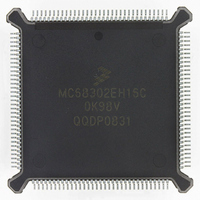MC68302EH16C Freescale Semiconductor, MC68302EH16C Datasheet - Page 63

MC68302EH16C
Manufacturer Part Number
MC68302EH16C
Description
IC MPU MULTI-PROTOCOL 132-PQFP
Manufacturer
Freescale Semiconductor
Datasheets
1.MC68302AG20C.pdf
(4 pages)
2.MC68302AG20C.pdf
(2 pages)
3.MC68302AG20C.pdf
(13 pages)
4.MC68302EH16C.pdf
(481 pages)
Specifications of MC68302EH16C
Processor Type
M683xx 32-Bit
Speed
16MHz
Voltage
5V
Mounting Type
Surface Mount
Package / Case
132-MQFP, 132-PQFP
Controller Family/series
68K
Core Size
32 Bit
Ram Memory Size
1152Byte
Cpu Speed
16MHz
No. Of Timers
3
Embedded Interface Type
SCP, TDM
Digital Ic Case Style
PQFP
Rohs Compliant
Yes
Family Name
M68000
Device Core
ColdFire
Device Core Size
32b
Frequency (max)
16MHz
Instruction Set Architecture
RISC
Supply Voltage 1 (typ)
5V
Operating Temp Range
0C to 70C
Operating Temperature Classification
Commercial
Mounting
Surface Mount
Pin Count
132
Package Type
PQFP
Lead Free Status / RoHS Status
Lead free / RoHS Compliant
Features
-
Lead Free Status / Rohs Status
RoHS Compliant part
Electrostatic Device
Available stocks
Company
Part Number
Manufacturer
Quantity
Price
Company:
Part Number:
MC68302EH16C
Manufacturer:
Freescale Semiconductor
Quantity:
135
Company:
Part Number:
MC68302EH16C
Manufacturer:
PANA
Quantity:
99
Company:
Part Number:
MC68302EH16C
Manufacturer:
Freescale Semiconductor
Quantity:
10 000
Part Number:
MC68302EH16C
Manufacturer:
FREESCALE
Quantity:
20 000
Company:
Part Number:
MC68302EH16CB1
Manufacturer:
Freescale Semiconductor
Quantity:
10 000
Company:
Part Number:
MC68302EH16CR2
Manufacturer:
Freescale Semiconductor
Quantity:
10 000
- MC68302AG20C PDF datasheet
- MC68302AG20C PDF datasheet #2
- MC68302AG20C PDF datasheet #3
- MC68302EH16C PDF datasheet #4
- Current page: 63 of 481
- Download datasheet (2Mb)
External Device Termination
Error Termination
3.1.5 IDMA Programming
Once the channel has been initialized with all parameters required for a transfer operation,
it is started by setting the start operation (STR) bit in the CMR. After the channel has been
started, any register that describes the current operation may be read but not modified
(SAPR/DAPR, FCR, or BCR).
Once STR has been set, the channel is active and either accepts operand transfer requests
in external mode or generates requests automatically in internal mode. When the first valid
external request is recognized, the IDMA arbitrates for the bus. The DREQ input is ignored
until STR is set.
STR is cleared automatically when the BCR reaches zero and the channel transfer is either
terminated by DONE or the IDMA cycle is terminated by a bus error.
Channel transfer operation may be suspended at any time by clearing STR. In response,
any operand transfer in progress will be completed, and the bus will be released. No further
bus cycles will be started while STR remains negated. During this time, the M68000 core
may access IDMA internal registers to determine channel status or to alter operation. When
STR is set again, if a transfer request is pending, the IDMA will arbitrate for the bus and con-
tinue normal operation.
Interrupt handling for the IDMA is configured globally through the interrupt pending register
(IPR), the IMR, and the interrupt in-service register (ISR). Within the CMR in the IDMA, two
bits are used to either mask or enable the presence of an interrupt reported in the CSR of
the IDMA. One bit is used for masking normal termination; the other bit is used for masking
error termination. When these interrupt mask bits in the CMR (INTN and INTE) are cleared
and the IDMA status changes, status bits are set in the CSR but not in the IPR. When either
INTN or INTE is set and the corresponding event occurs, the appropriate bit is set in the IPR,
and, if this bit is not masked, the interrupt controller will interrupt the M68000 core.
MOTOROLA
If desired, a transfer may be terminated by the device even before the BCR is decrement-
ed to zero. If DONE is asserted one setup time prior to the S5 falling edge (i.e., before or
with DTACK) during a device access, then the channel operation will be terminated fol-
lowing the operand transfer (see the DNS bit in the CSR). STR is cleared, and an interrupt
is generated if INTN is set. The BCR is also decremented, and the SAPR and/or DAPR
are incremented in the normal fashion. The use of DONE is not limited to external request
generation only; it may also be used to externally terminate an internally generated IDMA
transfer sequence.
When a fatal error occurs during an IDMA bus cycle, a bus error is used to abort the cycle
and terminate the channel operation. STR is cleared, either BED or BES is set, and an
error interrupt is generated if INTE is set.
MC68302 USER’S MANUAL
System Integration Block (SIB)
3-13
Related parts for MC68302EH16C
Image
Part Number
Description
Manufacturer
Datasheet
Request
R
Part Number:
Description:
Manufacturer:
Freescale Semiconductor, Inc
Datasheet:

Part Number:
Description:
MC68302 Configuring the Chip Selects on the MC68302
Manufacturer:
Motorola / Freescale Semiconductor

Part Number:
Description:
MC68302 Design Concept - Expanding Interrupts on the MC68302
Manufacturer:
Motorola / Freescale Semiconductor

Part Number:
Description:
MC68302 MC68302 Adapting a WAN Controller to a LAN Environment
Manufacturer:
Motorola / Freescale Semiconductor

Part Number:
Description:
MC68302 EKB Applications - Power Measurements on the MC68302
Manufacturer:
Motorola / Freescale Semiconductor

Part Number:
Description:
MC68302 Interfacing the MC68020 to a Slave MC68302
Manufacturer:
Motorola / Freescale Semiconductor

Part Number:
Description:
MC68302 MC68302 Software Performance
Manufacturer:
Motorola / Freescale Semiconductor

Part Number:
Description:
MC68302 Evaluating EDX on the ADS302
Manufacturer:
Motorola / Freescale Semiconductor

Part Number:
Description:
MC68302 Design Advisory #1 - MC68SC302 Passive ISDN Protocol Engine
Manufacturer:
Motorola / Freescale Semiconductor

Part Number:
Description:
MC68302, MC68360, and MPC860 Characteristics and Design Notes for Crystal Feedback Oscillators
Manufacturer:
Motorola / Freescale Semiconductor
Part Number:
Description:
Mc68302 Integrated Multi-protocol Processor
Manufacturer:
Freescale Semiconductor, Inc
Datasheet:
Part Number:
Description:
Manufacturer:
Freescale Semiconductor, Inc
Datasheet:
Part Number:
Description:
Manufacturer:
Freescale Semiconductor, Inc
Datasheet:
Part Number:
Description:
Manufacturer:
Freescale Semiconductor, Inc
Datasheet:
Part Number:
Description:
Manufacturer:
Freescale Semiconductor, Inc
Datasheet:











